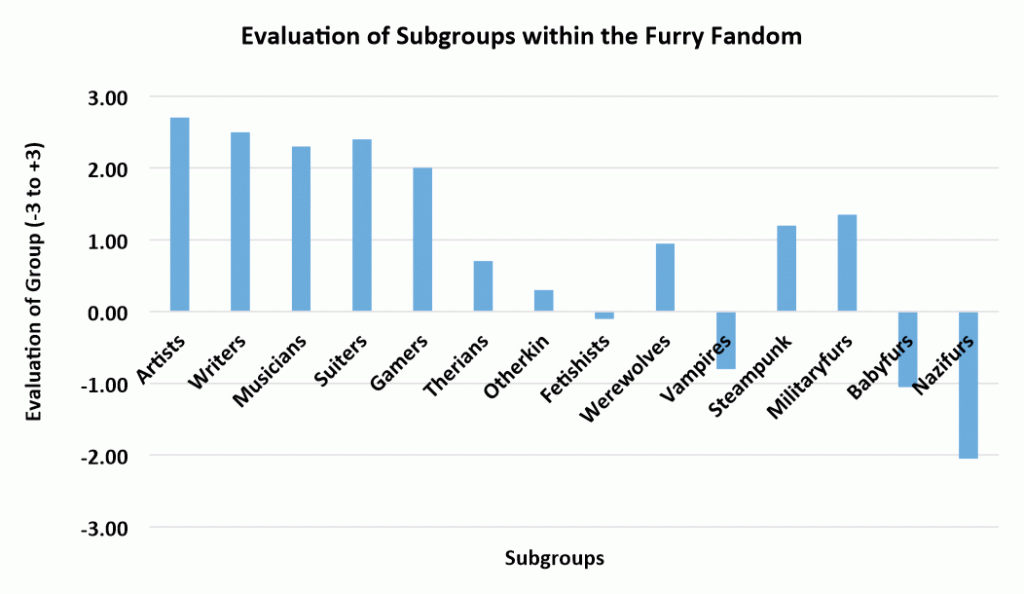Other research has shown that the furry fandom consists of a number of different subgroups.1 Furthermore, some of these groups (e.g., bronies) have been shown to experience stigma from both the general population and from within the fandom itself.2
To better understand which groups within the furry fandom experience stigma, we asked furries to indicate, on a scale from -3 (very negatively) to +3 (very positively), how they felt about each of a number of different groups. 3 It should be noted that the researchers do not, in any way, consider these results to be value judgments about the groups themselves, nor do the researchers wish to state that any group should or should not belong in the furry community. Instead, these data are taken as a reflection of the attitudes of the furry community toward sub- groups within the community.
The data suggest that while some groups are almost universally revered in the fandom (e.g., content creators), feelings toward others are more mixed (e.g., therians and otherkin, fetishists) or are negative (e.g., babyfurs). In the future, we plan to study the differences between these groups to determine the mechanisms underlying these evaluations.
In one follow-up study,4 we found evidence that certain subgroups within the furry fandom were more or less likely to experience bullying, either from within the fandom or from outside the fandom. For example: while bronies, as a group, are more likely to experience significantly more bullying from outside the fandom than other furries do, they do not experience any more bullying within the fandom, suggesting that bronies may consider the fandom to be a safe haven from bullying. In contrast, fursuiters experienced more bullying than non-fursuiter furries, both from outside the fandom and from within the fandom. Unexpectedly, babyfurs did not report experiencing more bullying from outside or within the fandom than the average furry, despite the fact that the study above found that babyfurs were, as a group, negatively evaluated by the furry fandom as a whole. Finally, furries self-identifying with the label “popufur,” which denotes an individual who is well-known or popular within the furry fandom (sometimes with a sarcastic or ironic connotation), were more likely to experience bullying within the furry fandom than those who did not consider themselves to be “popufur.”
In another follow-up study,5 we assessed the extent to which furries believed at least some subgroups within the fandom deserved the stigma they received, or believed they should be outright ostracized from the fandom altogether. Participants answered a series of 5 questions, indicating how strongly they agreed with each item (1 – Strongly Disagree, 7 – Strongly Agree). The table below reveals that most furries disagreed with the items, although the fandom was fairly ambivalent about whether or not certain groups in the fandom bring mockery upon themselves.
Agreement with Negative Beliefs about Certain Furry Subgroups
| Item | Agreement (1-7) |
| Some groups in the furry fandom should be discouraged from participating. | 2.91 |
| Some groups in the furry fandom should be made to feel they’re not welcome. | 2.13 |
| Some groups in the furry fandom bring mockery upon themselves. | 3.99 |
| Some groups in the furry fandom deserve the teasing they get. | 2.33 |
| Some groups in the furry fandom should not be allowed. | 2.45 |
Follow-up analyses revealed a number of factors that were associated with how negatively furries felt toward particular subgroups within the fandom. For example, how strongly furries identified with the furry fandom itself was unrelated to these attitudes, while being a more strongly identified furry predicted greater rejection of these negative ideas. In contrast, older furries were somewhat more likely to agree with these beliefs about particular subgroups with in the furry fandom, although the effect was a very small one.
References
- See sections 2.3 Fandom Activities; 2.6 Related Fandom Interests
- See sections section 8.2 Bronies: Attitudes toward Bronies; 8.3 Bronies: Stigma Justification
- International Furry Survey: Summer 2011
- Furry Fiesta 2016 Study
- Anthrocon 2016 Study


Recent Comments